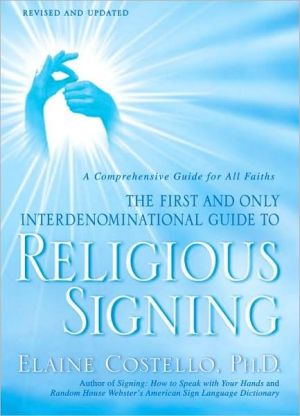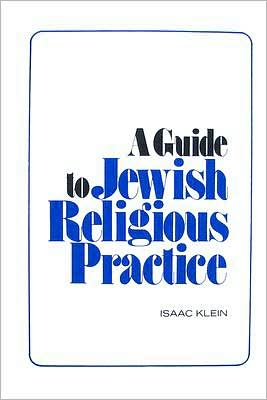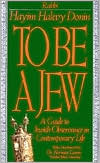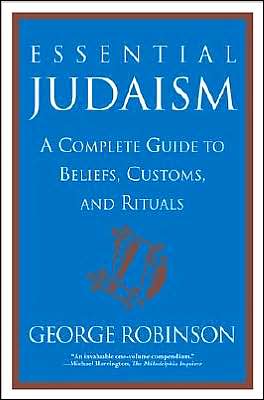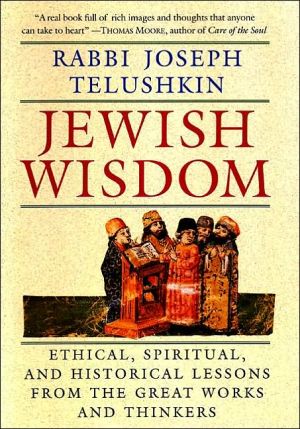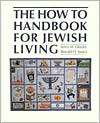What Jews Say about God
Search in google:
\ \ \ \ \ Chapter One\ \ \ The Essence\ and Nature of God\ \ \ \ * * *\ \ \ Introduction\ \ \ From its very inception Judaism has conceived of God as the sole Creator of the universe, as the Power who sustains it and rules over it in compassion and wisdom. As the gentle shepherd watches over his tender flock, so does God provide loving care for His fragile and vulnerable children. Unlike other belief systems, Judaism did not concern itself with finding proof of God's existence and mastery of the world; such belief was axiomatic. Unlike those who subscribe to polytheism, dualism, or trinitarianism, each day Jews affirm the unity of God through the words of the Shema (Deuteronomy 6:4):\ \ \ Hear O Israel, the Lord is our God, the Lord is One.\ \ \ Jews so passionately embraced the idea that one God, and He alone, is Master of the universe that they tried to ensure that the blight of idolatry not even remotely be associated with the father of the Jewish people. For this reason, Abraham is portrayed in the Midrash (Genesis Rabba 38:13) as an iconoclast who smashed the idols of his father, Terah. This myth was created to help establish Abraham as the innovator of the "One God" concept, as one who adamantly rejected any' contrary belief.\ The Bible itself says nothing about Terah and his beliefs or mode of worship, but the Midrash builds Abraham up as a monotheist who is so staunch in his belief that he would even contend against his father, portrayed as a manufacturer andworshiper of idols made of wood and stone, and destroy his gods. To prove that his father's idols are powerless, Abraham smashes most of them with a hatchet, which he then places in the hands of the largest idol.\ When Terah sees what his son had done, he cries out, "What mischief have you done to my gods?"\ "I have not done this," Abraham lies. "See, the hatchet is in the hands of your largest god! He did it. He did it because when I placed the savory meat before the idols, they all stretched out to take some first. The large idol was enraged because of their greed, and he smashed your idols." Abraham makes his point by showing how ridiculous is his father's belief in the power of the idols.\ In a further attempt to establish the Jewish forbears as monotheists, the last book of the Bible, II Chronicles (4:18), depicts Moses as a leader who was pure and undefiled by the idolatry of the house of Pharaoh in which he grew up. To promote this idea, it proposes that Pharaoh's daughter, who found the infant Moses in the bulrushes along the shore of the Nile River was actually a Jewess. II Chronicles gives her name as Bitya, meaning "daughter of God." Under the scenario presented, Moses was brought up by a God-fearing Jewess, not by an Egyptian idolatress and her family.\ In answer to the question of how it is possible to claim that Pharaoh's daughter was a Jewess, the Talmud offers the following explanation: "She went down to the river to cleanse herself of her father's idols" (Megilla 13a). To which Rabbi Yochanan adds: "Anyone who repudiates idolatry is a Jew."\ \ \ * * *\ \ \ What is the essence and nature of this One God who is the center of the Jewish belief system? Answering this question is difficult on many levels, particularly because of the limits of language in describing a nonphysical entity. Although God is anthropomorphized repeatedly in the Bible—He expels man from the Garden of Eden, orders Noah to build an ark, smells the pleasant odor of the offering brought by Noah, confuses the language of men when they decided to build the Tower of Babel, and so on—almost all Jewish philosophers and theologians are in agreement that God is not to be conceived of as having human form. This belief is based upon the biblical description of the Revelation on Mount Sinai: "You heard the sound of words, but you saw no form ..." (Deuteronomy 4:12).\ Moses Maimonides (1135-1204) was probably the first Jewish philosopher to state categorically that "whoever conceives of God as a corporeal being is an apostate" (Mishneh Torah, Hilchot Teshuva 3:7). One of his contemporaries, the French talmudist Abraham ben David of Posquières (1120-1190), also known by the acronym Ravad, argued that many good Jews believe that God has human form, and they are not to be considered heretics; they are simply in error for failing to understand that the anthropomorphic passages in Scripture and rabbinic literature were not meant to be taken literally.\ David Ben-Gurion, in a conversation with confidant Moshe Pearlman that was recorded in Perlman's Ben-Gurion Looks Back (1965), revealed his feelings on anthropomorphizing God:\ \ \ I know what God is not. He is not a man. He has no ears, no eyes.... Nevertheless, I do believe that there must be a being, intangible, indefinable, even unimaginable, but something infinitely superior to all we know and are capable of conceiving.\ \ \ Whether language can be used successfully to articulate the nature and essence of God has been the subject of endless discussion. Isaac Bashevis Singer expressed his feeling on the subject in his Coat of Many Colors: "Since He is a silent God, He talks in deeds, in events, and we have to learn this language."\ \ \ * * *\ \ \ This section contains a wide variety of quotations that relate to the essence and nature of God—His attributes and how He manifests Himself in the world.\ \ \ Aaron ben Elijah\ [c. 1300-1369]\ KARAITE PHILOSOPHER AND EXEGETE\ \ \ \ 1. God created the physical world and was not Himself created.\ 2. God is formless and incorporeal, unique and unitary, comparable to nothing in existence.\ Two of the Karaite ten principles of faith. From his Eitz Ha-chayim.\ \ \ Abba ben Memel\ THIRD-CENTURY PALESTINIAN SCHOLAR\ \ \ \ God said: My name is according to My work: when I judge, it is Elohim [God]; when I war on the wicked, it is Zebaot [Hosts]; when I suspend judgment, it is Shaddai [Almighty], and when I show compassion, it is Adonai [Lord].\ Quoted in Exodus Rabba (3:6).\ \ \ Abba Saul\ SECOND-CENTURY PALESTINIAN SCHOLAR\ \ \ \ Just as He is gracious and compassionate, be thou gracious and compassionate.\ Interpreting the verse "This is my God and I will honor Him; the God of my fathers, and I will exalt Him" (Exodus 15:2). Quoted in the talmudic tractate Shabbat (133b).\ \ \ (Rabbi) Abbahu\ Also known as Avahu\ THIRD-CENTURY TALMUDIC SCHOLAR\ \ \ \ God created other worlds and destroyed them before He created this one. He [God] said: "This one pleases me; the others did not."\ \ \ A view based upon the statement in Genesis (1:31) "and God saw all that He had done and behold it was very good," implying that much activity preceded the creation of our world. Quoted in Genesis Rabba (3:7) and Midrash Yalkut Shimoni, Ecclesiastes 968.\ \ \ * * *\ \ \ The first commandment ["I am the Lord thy God"] is to be compared to an earthly king who has a father or brother or son. But God said: "I am not like that [king] for I am first; I have no father ... I have no brother ... and I have no son.\ Quoted in Exodus Rabba (29:4), an apparent refutation of the Christian concept of a trinity.\ \ \ Abraham ben David\ [1120-1198]\ RABBI OF POSQUIÈRES, FRANCE\ \ \ \ How can he [Maimonides] say such a thing? Many people wiser and better than he were led to believe the language of the Bible and the stories of the aggada which say that God has a body.\ Criticizing Moses Maimonides for saying that anyone who believes that God is a corporeal being is a heretic.\ \ \ Morris Adler\ [1906-1996]\ U.S. CONSERVATIVE RABBI, AUTHOR\ \ \ \ Creation is not a completed event, permitting God to withdraw into a cosmic vastness outside of it. Creation is a dynamic, ongoing process.\ From his May I Have a Word with You? (1967).\ \ \ Jacob B. Agus\ [1911-1986]\ U.S. CONSERVATIVE RABBI, AUTHOR, SCHOLAR\ \ \ \ The word of God in the heart of man is not an auditory hallucination, but a power, a deposit of energy, a momentary upsurge toward a higher level of being.\ From an essay in Condition of Jewish Belief (1966), compiled by the editors of Commentary magazine.\ \ \ Akiba ben Joseph\ [c. 50-135]\ LEADING TALMUDIC SCHOLAR, ACTIVIST\ \ \ \ Beloved is man, for he was created in the image of God.\ Quoted in the Ethics of the Fathers (3:18).\ \ \ * * *\ \ \ As a house implies a builder, a dress a weaver, a door a carpenter, so the world proclaims God its Creator.\ From the Midrash Temura (chapter 3). Quoted in Joseph L. Baron's A Treasury of Jewish Quotations (1956).\ \ \ Joseph Albo\ [c. 1380-c. 1435]\ FIFTEENTH-CENTURY SPANISH RABBI, THEOLOGIAN\ \ \ \ We cannot imagine that even God can make a part equal to the whole; or a diagonal of a square equal to one of its sides; or two contradictory propositions true at the same time.\ Addressing the philosophical question often asked: Can God make an object that is so heavy that He Himself cannot lift it? From his philosophical work Sefer Ha-Ikkarim (1428).\ \ \ * * *\ \ \ A sage was asked if he knew the essence of God. He replied: "Had I known it, I should have been it."\ Ibid. Expressing the thought that only God can have knowledge of Himself. Man can know God only through His manifestation in the universe.\ \ \ * * *\ \ \ The prophets had to speak in a language understood by the masses, ... so they said that He is a jealous and avenging God.\ Ibid.\ \ \ Woody Allen\ [1935- ]\ U.S. ACTOR, WRITER, FILM DIRECTOR\ \ \ \ If it turns out that there is a God, I don't think that He's evil. But the worst that you can say about him is that basically He's an underachiever.\ From the 1975 film Love and Death.\ \ \ Robert Alter\ [1935- ]\ HEBREW SCHOLAR, LITERARY CRITIC\ \ \ \ Language in the biblical stories is never conceived as a transparent envelope of the narrated events, or as an aesthetic embellishment of them, but as an integral and dynamic component—an insistent dimension—of what is being narrated. With language God creates the world; through language He reveals His design in history to men. There is a supreme confidence in an ultimate coherence of meaning through language which informs the biblical vision.\ From an article in Commentary magazine, which he expanded upon in his Art of Biblical Narration (1981).\ \ \ Amos\ EIGHTH-CENTURY B.C.E. PROPHET OF ISRAEL\ \ The lion has roared who will not fear? The Lord God has spoken Who can but prophesy?\ From the Book of Amos (3:8).\ \ \ Anonymous\ A man strikes many coins from the same mold, and each is a duplicate of the other. But although the King of Kings, the Holy One, blessed be He, fashioned every man from the mold of the first man [Adam] not a single person is exactly like his fellowman.\ From the talmudic tractate Sanhedrin (37a).\ \ \ * * *\ If God does not approve, a fly won't make a move.\ A Yiddish folk saying.\ \ \ * * *\ \ \ Man was created single for the sake of peace among men, so that no one might say to his fellow: "My father was greater than yours."\ Emphasizing how important the establishment of peace is to God.\ \ \ * * *\ \ \ Adam was created [last of all beings] on the eve of the Sabbath, lest the Sadducees say: "God had a partner in man [when he created the world]."\ Quoted in the talmudic tractate Sanhedrin (38a).\ \ \ * * *\ \ \ There are three partners in man: the Holy One, blessed be He, his father, and his mother. His father supplies the semen of the white substance out of which are formed the child's bones, sinews, nails, the brain in his head, and the white in his eye; his mother supplies the semen of the red substance out of which is formed his skin, flesh, hair, blood, and the black of his eye; and the Holy One, blessed be He, gives him the spirit and the breath, beauty of features, eyesight, the power of hearing and the ability to speak and to walk, understanding and discernment. When his time to depart from the world approaches, the Holy One, blessed be He, takes away his share and leaves the shares of his father and his mother with them.\ Quoted in the talmudic tractate Nidda (31a).\ \ \ * * *\ \ \ Even those things which you may regard as completely superfluous to the creation of the world, such as fleas, gnats, and flies, even they too are included in the creation of the world, and the Holy One, blessed be He, carries out His purpose through everything, even through a snake, a scorpion, a gnat, or a frog.\ Quoted in Midrash Genesis Rabba (10:7).\ \ \ Israel Baal Shem Tov\ [c. 1700-1760]\ FOUNDER OF CHASIDISM\ \ \ \ People should get to know what the unity of God really means. To attain a part of this indivisible unity is to attain the whole. The Torah and all its ordinances are from God. If I therefore fulfill but one commandment in and through the love of God, it is as though I have fulfilled them all.\ Quoted in Solomon Schechter's Studies in Judaism (1896).\ \ \ * * *\ \ \ Everything created by God contains a spark of holiness.\ Quoted by Solomon Ansky in his play The Dybbuk ( 1918).\ \ \ * * *\ \ \ Unless we believe that God renews the work of Creation every day, our prayers and our observance of the commandments become routine and jaded. As it is written in the Book of Psalms (71: 9): "Cast me not off in the time of old age"—that is to say, do not let my world grow old.\ Quoted in Nahum Glatzer's In Time and Eternity (1946).\ \ \ * * *\ \ \ God never does the same thing twice. That which exists is unique, and it happens but once.\ Explaining why he once stood at the threshold of a synagogue but refused to enter. Quoted in Martin Buber's Legends of the Baal Shem (1955).\ \ \ * * *\ \ \ Man must think that all things in this world are permeated by the power of God; and all things accomplished through the thoughts of men, even the slightest of them, are done through His providence. It does not matter, therefore, whether the desire of a man is carried out or not, for God knows that it is better that it should not have been realized.\ From his Testament of The Besht.\ \ \ * * *\ \ \ The Shechina [God] permeates all four aspects [literally "worlds"] of nature: inanimate things, plants, living creatures, and man. Godliness is inbred in all creatures in the universe whether they be good or bad.\ Quoted in the work Toldot Yaakov Yosef, by Jacob Joseph Palonnoge (died 1782), a disciple of the Besht.\ \ \ Leo Baeck\ [1873-1956]\ GERMAN REFORM RABBI, THEOLOGIAN\ \ \ \ He is the One, and therefore man must decide for Him, in contrast to, and over and against all else, and must serve Him only....\ From his Essence of Judaism (1936).\ \ \ Bernard J. Bamberger\ [1904- ]\ U.S. REFORM RABBI, BIBLE SCHOLAR\ \ \ \ I hold to the faith—which does not seem to me unreasonable—that there is a cosmic root out of which man's values grow. I believe that man's strivings, above all his ethical strivings, are not irrelevant to the universe. I believe man has some kinship with ultimate reality. Or, in more traditional language—though no language is adequate---I believe in God as a living power.\ From an essay in Condition of Jewish Belief (1966), compiled by the editors of Commentary magazine.\ \ \ * * *\ \ \ Spinoza was a pantheist—he identified God with the world.... To Spinoza the world is God. The mental and spiritual life of man is just as much a part of God as the rocks or the sea; but Spinoza's God has no conscious purpose, no relationship to humanity. He is not a loving Father; prayer cannot be addressed to Him.\ From his The Story of Judaism (1964).\ \ \ Yosef Begun\ RUSSIAN REFUSENIK\ \ \ \ I can't say I am a strong Orthodox Jew now, but I continue to respect Jewish tradition and religion. It seems to me that a Jew cannot deny the existence of God. Maybe a Jew can be non-observant, but if a person decides that he wants to be a Jew, he cannot exist without the idea of God.... The Torah has seventy faces and every one of them is God.\ One of the most prominent refuseniks, from an interview with Walter Ruby. Begun was released from Christopol Prison in 198 7. While there, he became a very observant Jew. From an article in The Jewish World, October 15-21, 1993.\ \ \ Jack Bemporad\ CONTEMPORARY U.S. REFORM RABBI\ \ \ \ There is the problem of man's freedom in terms of his relation to God ... The problem of freedom concerns itself with an attempt to reconcile\ God's omnipotence with human responsibility. To say that God is omnipotent—in the traditional sense—means that God has all possible power.\ If God is all-powerful, then there can be no power other than God's. If there is no power other than God's, then man can have no power. If man has no power, then man can have no responsibility.\ From his essay "Toward a New Theology," in The American Judaism Reader (1967), edited by Paul Kresh.\ \ \ David Ben-Gurion\ [1886-1973]\ FIRST ISRAELI PRIME MINISTER (1948-1053; 1955-1963)\ \ \ \ I do believe in the existence of a spiritual, eternal, all-embracing superior being, but I cannot say that I share the belief of most of my orthodox friends. Is it not curious that even institutionalized religion nowhere describes God in any positive or recognizable way?...\ Nevertheless, as I say, I do believe that there must be a being, intangible, indefinable, even unimaginable, but something infinitely superior to all we know and are capable of conceiving. Without such a being, there are certain phenomena which just cannot be explained.\ Quoted in Ben-Gurion Looks Back: Talks with Moshe Pearlman (1965).\ \ \ Eliezer Berkovits\ [1908-1992]\ U.S. ORTHODOX RABBI, SCHOLAR, AUTHOR\ \ \ \ Man can only exist because God renounces the use of power on him. This ... means that God cannot be present in history through manifest material power. Such presence would destroy history. History is the area of human responsibility and its product.\ From his Faith After the Holocaust (1973).\ \ \ * * *\ \ \ God is mighty for He shackles His omnipotence and becomes powerless so that history may be possible.\ Ibid.\ \ \ * * *\ \ \ The foundation of religion is not the affirmation that God is, but that God is concerned with man and the world; that, having created this world, He has not abandoned it, leaving it to its own devices; that He cares about His creation. It is of the essence of biblical religion that God is sufficiently concerned about man to address Himself to him; that God values man enough to render Himself approachable by him.\ From his God, Man, and History (1959).\ \ \ * * *\ \ \ Judaism is essentially non-mystical because, according to it, God addresses Himself to man and He awaits man's response to the address. God speaks and man listens; God commands and man obeys. Man searches and God allows Himself to be found; man entreats and God answers. In the mystical union, however, there are no words and no law, no search and no recognition, because there is no separateness. Judaism does not admit the idea that man may rise "beyond Good and Evil," as it were, by drowning himself in the Godhead.\ Ibid.\ \ \ Daniel J. Boorstin\ [1914- ]\ U.S. LIBRARIAN, HISTORIAN, AUTHOR\ \ \ \ What preoccupies us, then, is not God as a fact of nature, but as a fabrication useful for a God-fearing society. God himself becomes not a power but an image.\ From his Image (1961).\ \ \ Eugene Borowitz\ [1924- ]\ U.S. REFORM RABBI, THEOLOGIAN\ \ \ \ Cohen's God, Baeck's mystery, Kaplan's peoplehood, Buber's Covenant and Heschel's Prophetic Sympathy, will not mesh together. The premises on which they are founded substantially contradict one another.\ In his Choices in Modern Jewish Thought (1983), arguing against the idea that a patchwork theology can be created by selecting the most appealing elements from prominent thinkers.\ \ \ Ruth Brin\ CONTEMPORARY U.S. POET\ \ \ \ When men were children, they thought of God as a father; When men were slaves, they thought of God as a master; When men were subjects, they thought of God as a king. But I am a woman, not a slave, not a subject, not a child who longs for God as father or mother. I might imagine God as a teacher or friend, but those images, like king, master, father or mother, are too small for me now.\ From her A Woman's Meditation (1979).\ \ \ * * *\ \ \ God is the force of motion and light in the universe. God is the strength of life on our planet; God is the power moving us to do good; God is the source of love springing up in us. God is far beyond what we can comprehend.\ Ibid.\ \ \ Martin Buber\ [1878-1965]\ GERMAN THEOLOGIAN, AUTHOR\ \ \ \ Whether or not we know it, what we really mean when we say that a god is dead is that the images of God vanish and that therefore an image, which up to now was regarded and worshipped as God, can no longer be so regarded and so worshipped.\ From his Israel and the World (1963).\ \ \ * * *\ The Jewish teaching of the wholeness of life is the other side of the Jewish teaching of the unity of God.\ Ibid.\ \ \ * * *\ \ \ A man is a heathen to the extent to which he does not recognize God in His manifestations.\ Ibid.\ \ \ * * *\ \ \ If anyone tells you that he loves God and does not love his fellow man, you will know that he is lying.\ From his Ten Rungs: Hasidic Sayings (1947).\ \ \ Ephraim Z. Buchwald\ CONTEMPORARY U.S. ORTHODOX RABBI, EDUCATOR\ \ \ \ It's really a very meaningful religion irrespective of whether you believe in God or not. The mitzvahs make sense even if you could prove black and white there is not God. This is just a meaningful way of life.\ Quoted in Tradition in a Rootless World (1991).\ \ \ Sid Caesar\ [1922- ]\ U.S. COMEDIAN\ \ \ \ I believe in something. I don't know if there is a God. I believe there is an energy, a force. Everything is energy and nothing disappears. The conservation law is at work.\ Quoted in Tim Boxer's Jewish Celebrity Hall of Fame (1987).\ \ \ Rene-Samuel Cassin\ [1887-1976]\ FRENCH-BORN NOBEL PEACE PRIZE WINNER, AUTHOR\ \ \ \ The monotheistic creed of the Jewish people, epitomized in the idea of one God, Father of all men, and strengthened by the bitter memories of slavery in Egypt, inspired in them rather early a vivid repugnance to serfdom. To them that institution is neither natural nor just.\ From his essay "From the Ten Commandments to the Rights of Man," in Of Law and Man (1971), edited by Sholomo Shoham.\ \ \ Marc Chagall\ [1887-1985]\ RUSSIAN-BORN ARTIST\ \ \ \ When I am finishing a picture, I hold some God-made object up to it—a rock, a flower, the branch of a tree or my hand—as a kind of final test. If the painting stands up beside a thing man cannot make, the painting is authentic. If there's a clash between the two, it is bad art.\ Quoted in the Saturday Evening Post, December 2, 1962.\ \ \ Chama ben Chanina\ THIRD-CENTURY PALESTINIAN TALMUDIC SCHOLAR\ \ \ \ As He [God] clothes the naked, visits the sick, comforts mourners, and buries the dead, so you do likewise.\ Quoted in the talmudic tractate Sota (14a).\ \ \ (Rabbi) Chanina\ FIRST-CENTURY DEPUTY HIGH PRIEST, SCHOLAR\ \ \ \ The seal of god is truth.\ Quoted in the talmudic tractates Shabbat (55a) and Yoma (69b).\ \ \ * * *\ \ \ One never injures a finger here on earth if it has not be so decreed from above.\ Commenting on a verse in the Book of Psalms (37:23). Quoted in the talmudic tractate Chulin (7b).\ \ \ * * *\ \ \ The seal of the Holy One, blessed be He, is emet, meaning "truth."\ Emet is spelled alef, mem, tav: the first middle and last letter of the alphabet. This led Samuel ben Nachmani to comment: "This describes the people who fulfill the Torah from alef to tav," from beginning to end. Quoted in the talmudic tractate Shabbat (55a).\ \ \ Chanina ben Dosa\ FIRST-CENTURY TALMUDIC SCHOLAR\ \ \ \ He in whom his fellowman takes delight, God takes delight as well.\ From the talmudic tractate Ethics of the Fathers (3:10).\ \ \ Chiya bar Abba\ THIRD-CENTURY TALMUDIC SCHOLAR\ \ \ \ God appeared to the people of Israel in keeping with the circumstance and need of each occasion. He appeared at the Red Sea as a mighty warrior, at Sinai as a teacher of children, in the prosperous times of Solomon as tall and sprightly as the cedars of Lebanon, and in Daniel's time as a Sage of the Torah.\ From the Mechilta (II:231), edited by Lauterbach.\ \ \ Hermann Cohen\ [1842-1918]\ GERMAN PHILOSOPHER, AUTHOR\ \ \ \ We call God an idea, meaning the center of all ideas, the idea of truth.\ Following in the footsteps of Kant. Quoted in Martin Buber's essay "The Love of God and the Idea of Deity," in his Israel and the World (1948).\ \ \ * * *\ \ \ Worm that I am, consumed by passions, cast as bait for egoism, I must nevertheless love man. If I am able to do so, and so far as I am able to do so, I shall be able to love God.\ Ibid.\ \ \ * * *\ \ \ The love of men for God is the love of the moral idea. I can love only the ideal, and I can comprehend the ideal in no other way save by loving it.\ Ibid.\ \ \ * * *\ \ \ Even God's omnipotence is delimited by mathematical and logical reason.\ Quoted in Reason and Hope: Selections from the Jewish Writings of Hermann Cohen (1971), translated by Eva Jospe.\ \ \ Robert Cohen\ WRITER, RADIO HOST\ \ \ \ He healed people by telling them how precious they were and how unconditionally he and God loved them—a mode of outreach that evangelical Christians have found phenomenally successful over the years but that most Jewish professionals have strenously avoided.\ Describing the influence of Rabbi Shlomo Carlebach. In Moment magazine, August 1997.\ \ \ David A. Cooper\ CONTEMPORARY U.S. RABBI, AUTHOR, KABBALIST\ \ \ \ What is God? In a way, there is no God. Our perception of God usually leads to a misunderstanding that seriously undermines our spiritual development. God is not what we think It is. God is not a thing, a being, a noun. It does not exist, as existence is defined, for It takes up no space and is not bound by time. Jewish mystics often refer to It as Ein Sof, which means "Endlessness."\ From his God Is a Verb: Kabbalah and the Practice of Mystical Judaism (1997).\ \ \ * * *\ \ \ The closest we can come to thinking about God is as a process rather than a being. We can think of it as "be-ing," as verb rather than noun. Perhaps we would understand this concept better if we renamed God. We might call It God-ing, a process, rather than God, which suggests a noun.\ Ibid.\ \ \ * * *\ \ \ This question [of how divine providence works] has plagued mystics and metaphysical thinkers for two thousand years. It is extremely difficult to address as long as we remain fixed on the old paradigm of God as a noun. However, once we move to the concept that God is a verb, and that the process of creation is relational, we gain new insight, for creation-ing cannot unfold without God-ing, and vice versa. It is like two gears turning against each other—if one gear is withdrawn, the other immediately stops.\ Ibid.\ \ \ Moses Cordovero\ [1522-1570]\ PALESTINIAN MYSTIC\ \ \ \ Do not attribute duality to God.... Do not say, "This is a stone and not God." ... Rather, all existence is God, and the stone is a thing pervaded by divinity.\ From his Shi'ur Koma.\ \ \ (King) David\ SECOND KING OF ISRAEL, RULED C. 1000-C. 960 B.C.E.\ \ \ \ The soul fills, carries, and survives the body, and the Holy One fills, carries, and outlives the universe. The soul is one, and the Holy One is one. The soul is pure, does not eat, sees and is unseen, and never sleeps, and the Holy One is pure, does not eat, sees and is unseen, and neither slumbers nor sleeps.\ Quoted in Leviticus Rabba (4:8), explaining why he praised God so often with his soul, as expressed in the Book of Psalms in Psalm 25:1 and scores of other verses.\ \ \ Lucy S. Dawidowicz\ [1915- ]\ HISTORIAN, TEACHER, AUTHOR\ \ \ \ Judaism is a man's religion not only in substance and in practice but in its symbolic theology. God is male. Israel in relation to God is female: the bridegroom God and the Virgin Israel. The Shekhinah, the Divine Presence, represents the female potency within God. The Torah is female, the Sabbath is female. In relation to them, God is male. In the books of the prophets and, of course, in the Song of Songs, marriage and sexual relations symbolize the ties between God and Israel, Israel and the Sabbath, Israel and Torah.\ Quoted in The Jewish Presence: Essays on Identity and History (1977).\ \ \ Alan M. Dershowitz\ [1938- ]\ U.S. PROFESSOR, ATTORNEY, AUTHOR\ \ \ \ Who would I like to meet if I could go back in time? I'd like to meet Job, and tell him he was right to complain about God. If the definition of chutzpah is a man who kills his parents and then demands mercy on the grounds that he is an orphan, the definition of an injustice is a God who authorizes the killing of innocent children, and then demands of their parents that they accept it as justice. I'd like to have patted Job on the back and said: "Even God was wrong in his final speech; you were right."\ From an interview with Eli Wohlgelernter in The Jerusalem Post, May 4, 1998.\ \ \ Wayne Dosick\ CONTEMPORARY U.S. CONSERVATIVE RABBI, AUTHOR\ \ \ \ Ruach Elohim, the spirit, the breath of God "hovered over the waters" [Genesis]. And then God began to create.... The breath of God is the breath, the life force, of human beings. We exist, we live, we are because our breath is the breath of God.\ From his Dancing With God (1997).\ \ \ Albert Einstein\ [1879-1955]\ GERMAN-BORN U.S. SCIENTIST\ \ \ \ Judaism is not a creed; the Jewish God is simply a negation of superstition, an imaginary result of its elimination.\ From his World As I See It (1934).\ \ \ * * *\ \ \ I believe in Spinoza's God who reveals Himself in the orderly harmony of what exists, but not in a God who concerns Himself with the fates and actions of human beings.\ When asked if he believes in God.\ \ \ * * *\ \ \ God is subtle, but He is not malicious.\ A remark made in April 1921 during a visit to Princeton University.\ \ \ * * *\ God is slick, but He ain't mean.\ Restating in 1946 his earlier statement, "God is subtle, but he is not malicious."\ \ \ (Rabbi) Eleazar\ SECOND-CENTURY TALMUDIC SCHOLAR\ \ \ \ Even at such times when God is filled with anger, He never fails to be compassionate.\ Quoted in the talmudic tractate Pesachim (87b).\ \ \ * * *\ \ \ The manner of human beings is for the lofty to take notice of the lofty and not of the lowly. But the manner of God is not so: He is lofty and He takes notice of the lowly.\ Quoted in the talmudic tractate Sota (5a).\ \ \ * * *\ God grieves over every man who is haughty in spirit.\ Ibid.\ \ \ Eleazar ben Simon\ SECOND/THIRD-CENTURY PALESTINIAN SCHOLAR\ \ \ \ God never found it necessary to converse with a woman, save one righteous one.\ Referring to Sarah, wife of Abraham. Quoted, in Genesis Rabba (20:6).\ \ \ Eleazar of Modin\ FIRST/SECOND-CENTURY TALMUDIC SCHOLAR\ \ \ \ If one wishes to adopt Judaism, in the name of God and for the sake of Heaven, welcome and befriend him, do not repel him.\ From the Midrash Mechilta to Exodus (18:6).\ \ \ Emil L. Fackenheim\ [1916- ]\ CONTEMPORARY U.S. REFORM RABBI, THEOLOGIAN, AUTHOR\ \ \ \ The universe we find ourselves in is an infinitely more complex and more wonderful construction than a clock. Is it likely, as the atheists maintain, that, while the clock was made for a purpose and according to a craftsman's design, the universe is only an accidental collection of atoms? Only an insane person would say this about the clock.... Just as the clock is evidence for the clockmaker, the universe is evidence for a universemaker—for God.\ From his Paths to Jewish Belief (1968).
Introductionix CHAPTER ONE The Essence and Nature of God1 CHAPTER TWO Searching For and Experiencing God73 CHAPTER THREE God, Jews, and the World-at-Large157 CHAPTER FOUR Miracles, Messianism, and the World-to-Come209 CHAPTER FIVE A Personal God253 CHAPTER SIX Sin, Suffering, and Repentance295 Index321
\ Church & Synagogue LibrariesThis very readable volume is highly recommended as a reference tool demonstrating the diversity of individual Jewish concepts of God throughout the ages.\ \ \ \ \ Publishers Weekly - Publisher's Weekly\ Kolatch (The Jewish Book of Why) argues that God reveals himself to Jews in many different guises. The complexity and often contradictory Jewish views of God, he explains, are enigmatic both to Jews and to outsiders. Kolatch gathers the voices of poets, novelists, rabbis, politicians, scientists and humorists as they talk about the nature of God, the experience of God, "God, Jews, and the World-at-Large," miracles and messianism, a personal God and "Sin, Suffering, and Repentance." Thus, on the nature of God, Beat poet Allen Ginsberg (1926-1997) notes, "The Jews always complained, kvetching about false Gods, and erected the biggest false God, Jehovah, in the middle of western civilization," while the Baal Shem Tov (1700-1760), the founder of Hasidism, declares, "Everything created by God contains a spark of holiness." On experiencing God, American actor Kirk Douglas says, "The Bible tells us that God created us; we can't create God. God is beyond and above us all." Theologian Abraham Joshua Heschel (1907-1972), speaking of the search for God, notes, "God is not indifferent to man's quest for Him. He is in need of man, in need of man's share of redemption. God who created the world is not at home in the world, in its dark alleys of misery, callousness, and defiance." Finally, on miracles and messianism, the great Reform rabbi Leo Baeck (1873-1956) exclaims, "The thought underlying the Messianic conception is that the soul must not allow itself to be subjugated to anyone but God." On the same topic, Mordecai Kaplan, the founder of Reconstructionist Judaism, proclaims, "Nothing could be more repugnant to the thinking man of today than the fundamental doctrine of Orthodoxy which is that tradition is infallible. Such infallibility could be believed in as long as the human mind thought of God and revelation in semi-mythological terms." Kolatch's collection offers a lively introduction to various ways of thinking about God, for Jews and non-Jews alike. (Sept.) Copyright 1999 Cahners Business Information.\ \

